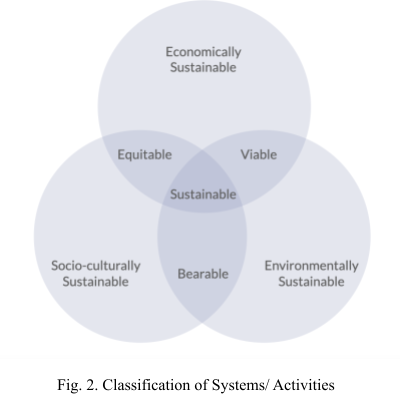The world today perceives the effects of Climate Change and Global Warming, ever so since the Covid-19 pandemic demonstrated how an environmental imbalance can cause global havoc. It is this dominance of Climate Change and Global Warming in our daily lives that have subconsciously let most people assign the concept of “Sustainability” to the environment alone. But “What is Sustainability?” is a deeper question than that. It does not just involve the environment, but it also involves people, cultures, social dynamics, and most importantly, economics. In all, ‘sustainability’ is a three-pillared concept. In the report, Our Common Future, from the Brundtland Commission formed by the United Nations in 1983, sustainable development was defined as: “development that meets the needs of the present without compromising the ability of future generations to meet their own needs” [1]. As a corollary, sustainability essentially means meeting our own needs, thinking about the needs of the generations to come. The state-of-the-art conceptualization of ‘Sustainability’ has three dimensions: Environmental, Socio-cultural and Economic. The state-of-the-art conceptualization of ‘Sustainability’ has three dimensions: Environmental, Socio-cultural and Economic.
Environmental Sustainability: Any human activity leads to depletion of earth’s resources and leaves an impact on the environment. A system is environmentally sustainable when the activities within it do not destroy the ecology, maintain all of the earth’s environmental systems and consume earth’s resources at a rate at which the planet can replenish them.
Socio-Cultural Sustainability: A system is socio-culturally sustainable when the activities within it fulfill basic human needs such as health, education, peace, culture, religion, human rights, self-provision, social justice, balance in life, and motivation. Society is conditioned in a way where the aforementioned aspects are ongoing long-term processes, secured also for the future generations.
Economic Sustainability: Economic sustainability refers to activities that utilize finite resources, both human and material, to generate economic growth in a way such that the resources are optimally used and can be recovered or naturally replenished. But economic
activity also encompasses the economic dimension, in the sense that, for an activity to be sustainable, it also has to generate enough economic profit to sustain itself. The field of sustainability frequently refers to an elementary Venn diagram that shows the relationship between the three dimensions.
The environmental dimension encompasses the other dimensions since the boundaries that the planet has, also define the boundaries that all social and economic systems within it have. For instance, the earth has a finite reserve of gold and all human activities around the metal, whether currency-related or ornamental, are limited by this finite reserve. Similarly, the boundaries that human society has, are also boundaries to all economic activities that the society can accommodate. A very relevant example here is how the Covid-19 pathogen recently incapacitated the global human society and brought all economic activity to a halt.

Also, commonly used is a Venn diagram that classifies different activities into different classes and demonstrates what is bearable, viable, equitable and finally, sustainable (Fig.2).

The actual definition of sustainability, as such, includes two other aspects that the common consumer typically does not assign to sustainability in conversational terms. The environmental aspect dominates our conception about sustainability so heavily, that the socio-cultural dimension is frequently unimagined of. And the economic dimension is usually regarded as contradictory to sustainability. But the holistic truth is that, in order for something to be sustainable, it has to be economically sustainable as well as preserve our social and cultural dynamics besides being gentle on the planet.
For Eco Friendly Products (Sustainable Products) visit Dzukou





